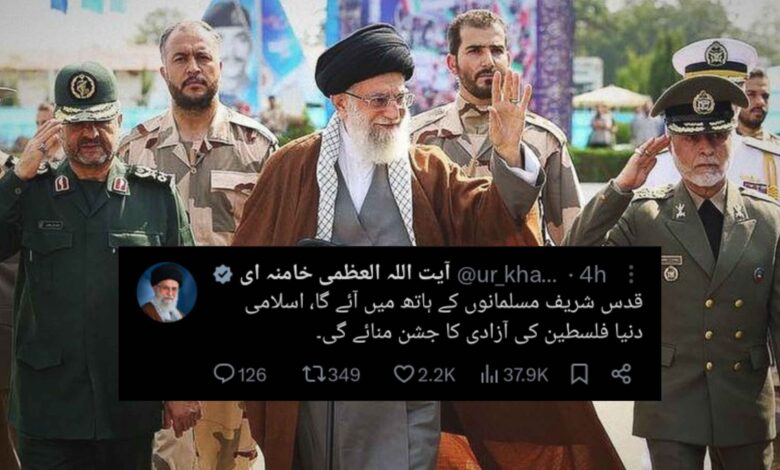Al-Quds will be in the hands of the Muslims’: Ayatollah Khamenei

Iran’s supreme leader, Ayatollah Ali Husseini Khamenei, delivered a fervent declaration on Sunday, asserting that the Holy Al-Quds, referring to Jerusalem, will ultimately be under Muslim control. In his statement shared on his official platform, Ayatollah Khamenei expressed a strong conviction that the Muslim world will celebrate the eventual liberation of Palestine. This proclamation underscores Iran’s longstanding stance on the Israeli-Palestinian conflict and its unwavering support for Palestinian aspirations for statehood and self-determination.
Khamenei’s declaration comes at a time of heightened tensions in the region, with the Israeli-Palestinian conflict persisting as one of the most intractable and contentious issues in the Middle East. Iran, a staunch supporter of the Palestinian cause, has consistently condemned Israeli occupation and advocated for the establishment of an independent Palestinian state with East Jerusalem as its capital. The supreme leader’s words are likely to resonate across the Muslim world, particularly among those who share similar sentiments regarding the Palestinian struggle.
The reference to Al-Quds, the Arabic name for Jerusalem, holds deep religious significance for Muslims worldwide, as it is home to some of Islam’s holiest sites, including the Al-Aqsa Mosque and the Dome of the Rock. Khamenei’s assertion of Al-Quds returning to Muslim hands taps into this emotional and spiritual connection, framing the struggle for Palestinian liberation within a broader Islamic context.
However, Khamenei’s statement is certain to provoke strong reactions, particularly from Israel and its allies, who view Jerusalem as the undivided capital of the Jewish state. The assertion of Muslim ownership over Al-Quds challenges the status quo and could exacerbate tensions in an already volatile region, potentially fueling further discord and conflict.
Moreover, Khamenei’s words may also have diplomatic implications, potentially complicating efforts for peace negotiations or diplomatic initiatives aimed at resolving the Israeli-Palestinian conflict. Iran’s vocal support for Palestinian liberation has often been a point of contention in international relations, with Western powers and Israel viewing Tehran’s involvement as destabilizing and counterproductive to peace efforts.
Ultimately, Ayatollah Khamenei’s declaration reaffirms Iran’s steadfast commitment to the Palestinian cause and its vision for a future where Jerusalem is returned to Muslim control. While his words may galvanize support among some segments of the Muslim population, they also risk further entrenching divisions and complicating efforts to achieve a peaceful resolution to the Israeli-Palestinian conflict. As the situation in the region continues to evolve, the implications of Khamenei’s statement will undoubtedly reverberate across geopolitical landscapes, shaping the discourse surrounding the Israeli-Palestinian conflict for the foreseeable future.





